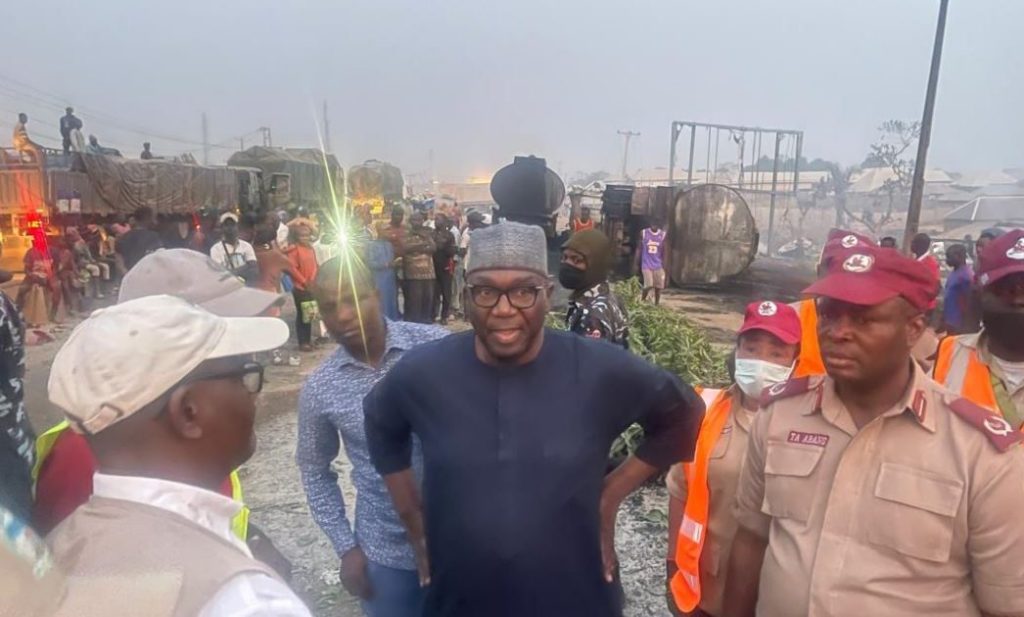The Nigeria Governors’ Forum (NGF) has expressed profound sorrow and condolences following the devastating petrol tanker explosion that occurred on Saturday, along the Dikko-Maje Road in Suleja Local Government Area of Niger State. The tragic incident, which claimed the lives of at least 50 individuals and left numerous others injured, transpired as people attempted to scoop fuel from an overturned tanker that had spilled its contents onto the road. The NGF, in a statement released by Rafiu Ajakaye, Chief Press Secretary to the Kwara State Governor and NGF Chairman Abdulrahman Abdulrazaq, conveyed its deepest sympathies to the families of the victims and to Governor Umar Bago of Niger State. The Forum offered prayers for the repose of the souls of the deceased and wished the injured a swift and complete recovery.
The statement underscored the gravity of the situation, describing the explosion as a tragic incident that has caused immense pain and suffering. The Forum reiterated its call for caution and respect for life, particularly in hazardous situations such as fuel spills, urging citizens to prioritize their safety and avoid engaging in risky behavior that could endanger their lives and the lives of others. The NGF emphasized the importance of adhering to safety regulations and exercising utmost care in the handling of flammable materials. The Forum’s expression of condolence reflects the collective grief and concern of the nation’s governors over the devastating loss of life and the widespread impact of the tragedy on the affected community.
The incident in Suleja serves as a stark reminder of the recurring dangers associated with fuel tanker accidents and the tragic consequences that often ensue when people attempt to scoop fuel from leaking tankers. This practice, driven by poverty and desperation, exposes individuals to extreme risks, including fire explosions, asphyxiation, and severe burns. The explosion also highlights the urgent need for improved safety measures in the transportation and handling of petroleum products, as well as enhanced public awareness campaigns to educate communities about the dangers of scooping fuel from spilled tankers.
The National Emergency Management Agency (NEMA) swiftly responded to the disaster, deploying an emergency rescue team to the scene of the explosion to provide immediate assistance to the victims and coordinate rescue efforts. The agency’s prompt intervention underscores the importance of a coordinated emergency response system to mitigate the impact of such tragedies and provide timely support to affected communities. The response also highlights the critical role of emergency management agencies in disaster preparedness, mitigation, and response.
Beyond the immediate response, the incident necessitates a comprehensive evaluation of the factors contributing to such accidents, including the condition of roads, the maintenance of tanker vehicles, and the enforcement of safety regulations. Addressing these underlying issues is crucial to preventing future occurrences and safeguarding the lives and well-being of communities located along major transportation routes. A proactive approach to safety management, encompassing regular inspections, driver training, and community education, can significantly reduce the risks associated with the transportation of hazardous materials.
The Suleja tanker explosion serves as a tragic wake-up call, demanding a concerted effort to address the systemic issues that contribute to such incidents. The loss of life underscores the urgent need for improved safety standards, robust emergency response mechanisms, and sustained public awareness campaigns. By working collaboratively, government agencies, industry stakeholders, and community leaders can create a safer environment for all and prevent future tragedies of this magnitude. The memory of those who perished in this incident should serve as a constant reminder of the importance of prioritizing safety and taking proactive steps to prevent similar occurrences.


